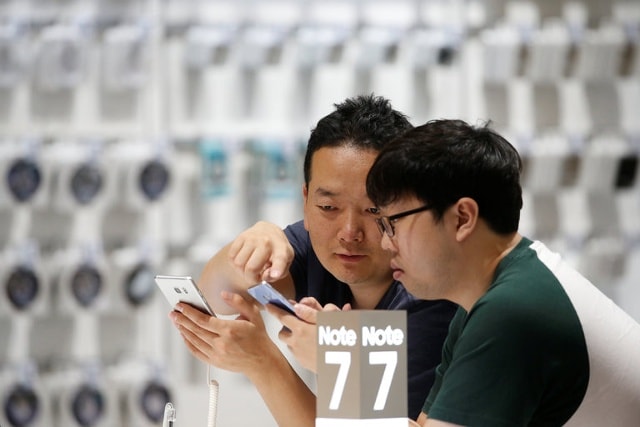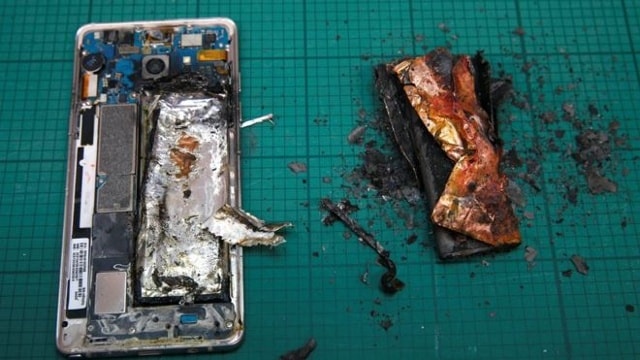Galaxy Note 7 Discontinuation - Samsung's Big Challenge
(Baonghean) -Samsung has just officially announced the recall and discontinuation of the Galaxy Note 7. This is considered a big challenge for this phone company and is of interest to the technology world.Let's take a look at the problems Samsung faced during this incident and how they solved the problem.
Product problem
In 1995, Samsung had a problem with the quality of a phone line, immediately, Chairman Lee Kun-hee, the most famous businessman in Korea, angrily burned 150,000 of these defective phones.
This destruction can be considered a turning point for Samsung's reputation over the past two decades, from being associated with the title of a cheap counterfeit manufacturer, Samsung has become a leading manufacturer in product quality, design and distribution of electronic products.
 |
| Customers try out the Samsung Galaxy Note 7 in South Korea. Photo: New York Times. |
This year, once again, a product quality problem occurred with the company's best-selling smartphone line - Samsung Galaxy Note 7.
Launched in mid-August this year, this high-end phone line was expected to give Samsung an advantage over its main competitor, Apple. However, not long after that, nearly 100 reports of fires allegedly caused by this phone attracted attention.
The Galaxy Note 7 has been linked to at least one house fire, a Jeep fire, and multiple instances of smoke on flights. The Federal Aviation Administration has also warned passengers not to turn on their Galaxy Note 7 devices on planes or to keep them in checked baggage.
Most recently last Wednesday, Southwest Airlines had to evacuate a plane after a Samsung phone caught fire.
Faced with negative news, on Monday, Samsung decided to stop selling the Galaxy Note 7 product line globally. The decision to stop selling the Galaxy Note 7 was made after Samsung announced on September 2 that it would recall 2.5 million phones. This is considered the largest recall in the history of the smartphone industry.
Samsung had previously said it had identified the issues and allowed users to exchange their phones for newer models. However, the company has suspended sales and exchanges of the phones entirely after four major U.S. retailers stopped selling the phones amid reports of problems, even with replacements. Samsung has also advised users to turn off their Note 7s and return them or exchange them for another model.
The US Consumer Product Safety Commission backed Samsung's move, urging consumers to stop using the phones. Jan Dawson, a tech industry analyst at Jackdaw Research, said it was bad news for Samsung and that the Note 7 was "virtually dead." Samsung is expected to release the results of a more extensive investigation later this week.
Samsung's loss
Before the recall, Strategy Analytics estimated that Samsung could sell up to 15 million Note 7 phones in 2016. However, at the present time, with $180 billion in annual revenue, Samsung could lose up to $10 billion related to the recent troubles.
Samsung's reputation has also been greatly affected on social networks. Specifically, since the Note 7 incidents began, negative messages about Samsung increased 450% on Twitter compared to before.
The impact is not just on one product line but on the entire Samsung brand. Yoo Jong-woo, an analyst, said the cause of the incident needs to be found and clearly announced so that Samsung customers no longer have doubts about its products. Samsung shares fell 7.3% on Monday, the deepest drop in a month.
Cause of the problem
Samsung claims the batteries were the cause of the problems because they were made by a separate supplier. It has since switched to a different supplier and the products are safe. But Samsung is still struggling to figure out what caused the battery failures and to explain how a company known for manufacturing could have problems twice, both in the original and the replacement products.
Tech experts suspect the problems may lie outside the manufacturing process, or in the software design. In general, this is a problem that technology companies are prone to encounter.
In 1994, Intel was forced to recall its flagship Pentium processor because of a flaw in the algorithms used to build it. Dell recalled more than 4 million laptops in 2006 because of exploding lithium batteries made by Sony. Other companies such as Fitbit and Microsoft have also had manufacturing problems over the years.
Impact on the smartphone industry
These incidents of Samsung - the world's leading smartphone seller - are a rare opportunity for competitors, especially Apple. A technology analyst from Needham & Company said that this event caused a billion-dollar decline in Samsung's brand value.
 |
| A Note 7 phone caught fire in a lab in Singapore. Photo: BBC. |
Featuring high battery capacity, eye recognition function for enhanced security, fast wireless charging technology, Galaxy Note 7 is Samsung's most expensive phone sold with the aim of directly competing with Apple's iPhone.
So it can be seen that Apple is the one who benefits the most from Samsung's problem. Besides, Google, the owner of the Android operating system that runs on most Samsung phones, is having difficulty selling its own phone lines.
Other smartphone companies such as Huawei and Xiaomi are looking to expand their positions outside of China to compete with Samsung worldwide./.
Phan Vu
